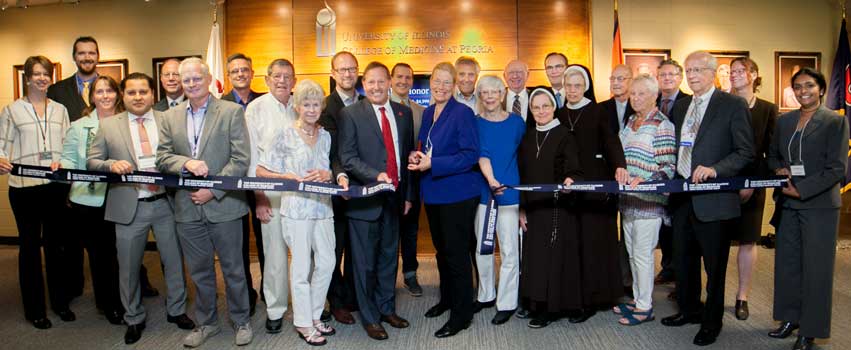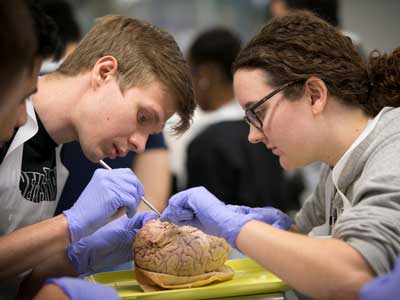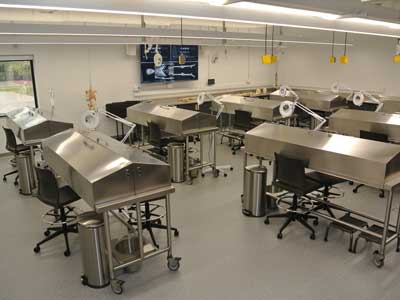
New initiatives at UICOMP are strengthening healthcare for patients, as well as the regional economy.
Healthcare is a personal issue. Each of us desires access to the highest quality of healthcare close to home. It is also an economic issue. In fact, healthcare and its related services make up the largest employment sector of the Greater Peoria economy. The College of Medicine plays a critical role in healthcare delivery and our healthcare economy.
Peoria’s growth as a regional healthcare referral center is critical to its continued economic health. Physicians are not the only key factor to growing the healthcare economy, but they are an essential component. It is critical that we train, recruit and retain talented physicians who are able to take excellent care of the patients in our community, as well as help lead our healthcare economy into the future.
The Aging Physician Workforce
Why is physician supply so urgent? One important reason is that the physician population is getting older and physicians are retiring at younger ages. According to the latest Association of American Medical Colleges (AAMC) physician supply report, almost one third of all practicing physicians in this country are age 60 or older. Rural areas in central and southern Illinois may have even greater percentages of older physicians who are practicing but beginning to consider retirement.
This concern about the aging physician workforce is exacerbated by increasing demands for physicians, especially in primary care fields and general surgery. Recruitment of physicians to central Illinois can be challenging, particularly if the physician or their spouse lack ties to the area. Both of our major academic clinical partners, UnityPoint Health and OSF HealthCare, view physician shortages, particularly in non-urban areas, as a source of major concern.
The College of Medicine provides a bright side for central Illinois, as physicians tend to practice in the communities where they complete medical school or residency. The AAMC report notes:
- 46.6 percent of physicians who graduated from a public medical school were active in the same state;
- 47.5 percent of physicians were active in the state where they completed their most recent graduate medical education program; and
- 67.1 percent of physicians who completed medical school and their graduate medical education in the same state remained in that state to practice.
 UICOMP’s medical students and residents are the future physicians of central Illinois. We already do a good job of providing a pipeline of physicians, with about 60 percent of primary care physicians in the area being graduates of the University of Illinois system for medical school or residency.
UICOMP’s medical students and residents are the future physicians of central Illinois. We already do a good job of providing a pipeline of physicians, with about 60 percent of primary care physicians in the area being graduates of the University of Illinois system for medical school or residency.
In addition, UICOMP produces physician leaders. Keith Knepp, president of UnityPoint Health, and Steve Hippler, chief clinical officer at OSF HealthCare, are just two examples of many UICOMP-trained physician leaders in central Illinois. The opportunity to interact with students, residents and fellows attracts physicians educated in other academic institutions to choose Peoria as their practice site. This helps grow the specialized programs that provide tertiary and quaternary care to patients referred to Peoria from across the state.
Local Impact Through Collaboration
UICOMP believes we can do an even better job of attracting, educating and retaining physicians. We are doing outreach with surrounding colleges to be sure that qualified medical student applicants know what Peoria has to offer. We are working with Jump on STEM programs and pre-med curriculum to get young people excited about medical careers. We are providing medical students with early ambulatory experiences in primary care offices, hoping to encourage them to choose primary care as a specialty.
In addition, we are strengthening our Rural Student Preceptor program to encourage medical students to practice in rural communities. We created a medical school track called “Innovations in Rural Global Medicine” to help attract students who might wish to practice in non-urban areas. Our residencies and fellowships also continue to flourish, in partnership with OSF Healthcare and UnityPoint: five new fellowship programs in the past five years.
Particularly exciting, UICOMP marked a historic moment last fall with the addition of first-year medical students on the Peoria campus. Now, all students will spend their entire four years in Peoria! We invested over $3 million in campus upgrades, including innovative technology, a new small group classroom and anatomy wing. We are phasing in a new curriculum that enhances students’ clinical experiences and provides greater opportunity to prepare for careers in medicine.
 In addition to our impact on the physician workforce, I would be remiss if I didn’t mention that UICOMP also supports healthcare through the direct provision of patient care. This is done through the Heartland FQHC (Federally Qualified Health Center), through inpatient adult care, within Children’s Hospital of Illinois, in the Pediatric Resource Center, at the St. Jude Midwest Affiliate and in Positive Health Solutions, among others. We have provided community education in CBCT (Cognitively Based Compassion Training).
In addition to our impact on the physician workforce, I would be remiss if I didn’t mention that UICOMP also supports healthcare through the direct provision of patient care. This is done through the Heartland FQHC (Federally Qualified Health Center), through inpatient adult care, within Children’s Hospital of Illinois, in the Pediatric Resource Center, at the St. Jude Midwest Affiliate and in Positive Health Solutions, among others. We have provided community education in CBCT (Cognitively Based Compassion Training).
We also conduct research within the Cancer Research Building, across our clinical departments, and in collaboration with Jump Simulation. The results of this research are published in important journals influencing healthcare across the country and the nation. The opportunity to engage in research also helps attract and retain physicians in our community.
The leadership, faculty and staff of UICOMP are committed to our mission: to lead collaboration to improve health. Working with our partner hospitals, we already play a critical role in the healthcare economy and the overall health of our community. We believe that our revised curriculum, new learning spaces, expansion to a four-year school, increasing class sizes and new fellowships/residencies will further strengthen healthcare for patients and the healthcare economy in central Illinois. We are committed to continually improving our performance as one of the key contributors to our healthcare delivery system. iBi
Sara Rusch, MD, is the regional dean for the University of Illinois College of Medicine Peoria.

